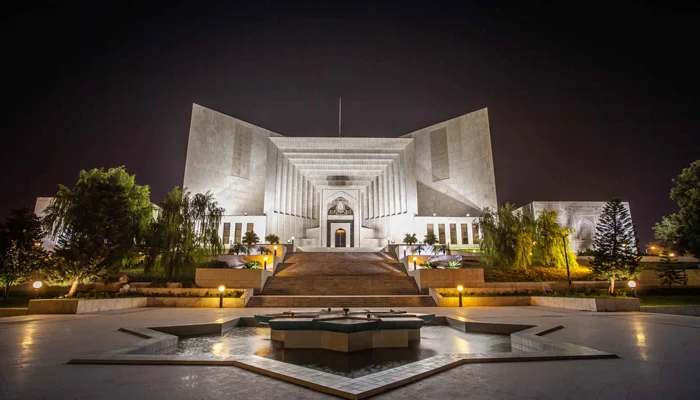ISLAMABAD, Oct 14(ABC): In its detailed order on a presidential reference, Pakistan’s top court left it up to the parliament to decide the time period for disqualification of a dissident member of parliament.
“To impose a lifetime ban is to remove the defector for all cycles to come. Since Article 63(1)(p) confers the necessary competence on Parliament, on reflection it is our view that the matter is best left to the legislature,” the Supreme Court said in a 95-page detailed verdict on the presidential reference seeking interpretation of Article-63-A of the Constitution.
A five-judge bench headed by Chief Justice Umar Ata Bandial — and comprising Justice Ijaz ul Ahsan, Justice Mazhar Alam Khan Miankhel, Justice Munib Akhtar, and Justice Jamal Khan Mandokhail — issued the verdict. Justice Akhtar authored the 95-page majority judgment.
The detailed judgment begins with a quote from Chief Justice Marshall: “[We] must never forget that it is a constitution that we are expounding.”
The apex court ruled that the votes of dissident members of the parliament (MPs), cast against their parliamentary party’s directives, cannot be counted.
“It is our view that the vote of any member (including a deemed member) of a Parliamentary Party in a House that is cast contrary to any direction issued by the latter in terms of para (b) of clause (1) of Article 63A cannot be counted and must be disregarded, and this is so regardless of whether the Party Head, subsequent to such vote, proceeds to take, or refrains from taking, action that would result in a declaration of defection,” read the judgment.
Interpreting the Article-63-A, the SC bench said that a member of a house shall be deemed to defect from a political party if he, having been elected as such, as a candidate or nominee of a political party or under a symbol of a political party or having been elected otherwise than as a candidate or nominee of a political party, and having become a member of a political party after such election by means of a declaration in writing:
- commits a breach of party discipline which means a violation of the party constitution, code of conduct and declared policies, or
- votes contrary to any direction issued by the Parliamentary Party to which he belongs, or
- abstains from voting in the House against party policy in relation to any bill.
The top court ruled that counting votes cast against party policy is a threat to the democratic system.
The reference
The former PTI-led government had decided to approach the SC for clarity on Article 63(A) as several PTI lawmakers announced to vote on the no-trust motion against then prime minister Imran Khan — a violation of the party policy.
Despite their decision of not siding with their leader, none of the PTI MNAs had cast their votes of no-confidence against Khan, as the then opposition already had the required 172 votes to oust him.
In the reference, the government sought the apex court’s opinion on two interpretations of Article 63(A) and which one should be adopted and implemented to achieve the constitutional objective of curbing the menace of defections, purification of the electoral process, and democratic accountability.
The reference stated if the constitutional disapproval and prohibition against defection were effectively enforced with deterrence for the future as well, many such members would stand disqualified for life under Article 62(1)(f) and would never be able to pollute democratic streams.
What is Article 63(A)?
Article 63(A) of the Constitution of Pakistan deals with the defection of parliamentarians.
According to the article, a lawmaker can be disqualified on the grounds of defection if they vote or abstain from voting in the House contrary to any direction issued by the parliamentary party to which they belong.
However, this is restricted to three instances where they have to follow the party’s directions:
- Election of the prime minister or chief minister;
- Vote of confidence or a vote of no-confidence;
- Money bill or a Constitution (amendment) bill.
Per the article, the head of the party is required to present a written declaration that the MNA concerned has defected.
However, prior to presenting the declaration, the head of the party will have to give the MNA concerned a chance to explain the reasons for defection.
Following that, the party chief will then forward the written declaration to the speaker, who would, in turn, hand it over to the chief election commissioner (CEC).
The CEC will have 30 days at their disposal to confirm the declaration. Once confirmed, the MNA concerned will no longer be a member of the House and their “seat shall become vacant”.

